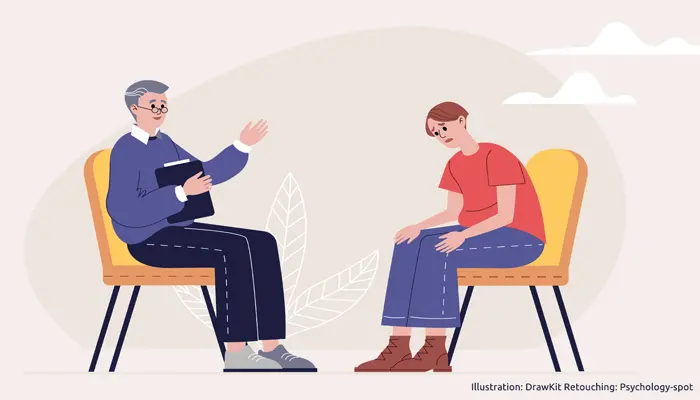
A family is much more than a group of people living under the same roof. In fact, maintaining strong family relationships is essential to leading a happy and healthy life. This is demonstrated by a study carried out at Michigan State University in which it was found that when our partner is happy and we feel satisfied in the relationship, we have better health.
However, home is not always the place where we find the support and love we need. Sometimes family dynamics become complicated and communication breaks down, giving rise to conflicts and problems that can considerably affect coexistence and our well-being. When relationships become strained and each member entrenches themselves in their position, solving problems can seem like an impossible mission. In that case, family therapy can come to your aid.
What is family therapy?
“All happy families are alike, but every unhappy family has a special reason for being unhappy,” wrote Leo Tolstoy. Psychological therapy addresses precisely the unique problems of each family unit.
It is a type of counseling focused on improving communication and relationships within families. Basically, the therapist helps identify dysfunctional behavior patterns that fuel conflicts and provides strategies so that family members can communicate better and resolve latent problems.
Family therapy provides a safe environment for all people to talk about their feelings and concerns. The sessions not only facilitate emotional expression, but also promote a deeper understanding of others’ perspectives to build stronger family bonds.
What is family therapy for?
Family therapy is useful for dealing with a wide variety of problems, from parent-child conflicts to sibling rivalries, parenting discrepancies, relationship difficulties, problems with family of origin, and communication failures. In addition, it provides numerous benefits, both for the family nucleus and individually:
1. Gain self-awareness
Family therapy not only addresses the dynamics between members, it also encourages self-reflection and individual awareness. In the sessions, each person has the opportunity to explore their thoughts, emotions and attitudes at home. By understanding how your behaviors influence family dynamics, you can make positive changes and assume greater responsibility and commitment. That often translates into a journey of personal growth whose effects can extend to other areas of your life.
2. Improve communication
Family therapy encourages constructive dialogue, so little by little you will feel more comfortable speaking in a more open, honest and healthy way. Everyone will be able to express their fears, doubts and concerns in an environment free of judgment and destructive criticism. The therapist will model communication techniques so that each member can develop active listening and learn to express what concerns them assertively. These communication skills will accompany you for the rest of your life and you can use them in other scenarios.
3. Develop coping skills
Family life is full of challenges, so it is essential to have the appropriate skills to face them successfully. A therapist will be able to teach you stress management and conflict resolution techniques so that you can approach problems and challenges more constructively. When families have the right “toolbox,” they can better deal with future difficulties by staying together and supporting each other. Furthermore, these coping skills promote the resilience and adaptability of each member in different situations, beyond the domestic context.
4. Set healthy boundaries
Family therapy not only serves to strengthen ties but also to establish norms and rules of coexistence that promote the well-being of all its members. In fact, in some cases family conflicts arise precisely because of the lack of clear boundaries. For example, a parent may claim much of the time and attention of their adult children, which can lead to relationship problems. A therapist will help you identify the norms you need to function as a family so that no one continually feels overwhelmed, stressed, or even manipulated.
5. Define family roles
A family is an organized system in which each member performs different functions and has certain expectations about the behaviors of others. Role confusion or discomfort with the assigned role can become a major source of conflict within you. A therapist will help you level your expectations and clarify your roles, so that each person can contribute their best to the family unit and feel comfortable with the role they play.
6. Adapt to significant life changes
Family therapy is not a resource to resort to only when problems appear, it also has a preventive function. Counseling can be particularly helpful when families are faced with a potentially destabilizing change in their lives. Significant events, such as a divorce, death, moving to another city, the birth of a child or even retirement, can break up the family. A psychologist will be able to help you express your feelings, understand how this situation is affecting others and create a support network that contributes to the well-being of everyone.
7. Resolve entrenched conflicts
Conflicts in families can occur between any of its members for the most varied reasons. Maybe you don’t get along with your parents, have a problem with a sibling, or can’t stand your in-laws. Often these differences end up lengthening their shadow, generating a tense climate that affects family functioning. In family therapy, a safe environment is created to address these problems without blaming anyone or making them a scapegoat. It offers a framework to understand the origin of these discrepancies and better grasp the nuances of the conflict with the aim of finding a solution based on empathy.
In a general sense, family therapy provides a space to heal emotional wounds, improve relationships, and foster a harmonious environment at home. When conflicts are resolved, communication is improved, and healthier ways to interact are found, everyone wins.
In fact, a study carried out at the University of Miami even found that the benefits of brief strategic family therapy are maintained years later. In therapy, each person will have a space to explain why they act in a certain way and understand why others respond as they do. This way everyone will be able to put themselves in the other’s shoes and better understand how to relate. This deeper understanding of others and family dynamics will serve to strengthen the emotional bonds that will allow you to feel better, physically and psychologically.
References:
Varghese, M. et. Al. (2020) Family Interventions: Basic Principles and Techniques. Indian J Psychiatry; 62(2): S192–S200.
Chopik, W. J. & O’Brien, E. (2016) Happy You, Healthy Me? Having a Happy Partner Is Independently Associated With Better Health in Oneself. Health Psychology; 36(1): 21–30.
Horigian, V. E. et. Al. (2015) A Cross-sectional Assessment of the Long Term Effects of Brief Strategic Family Therapy for Adolescent Substance Use. Am J Addict; 24(7): 637–645.



